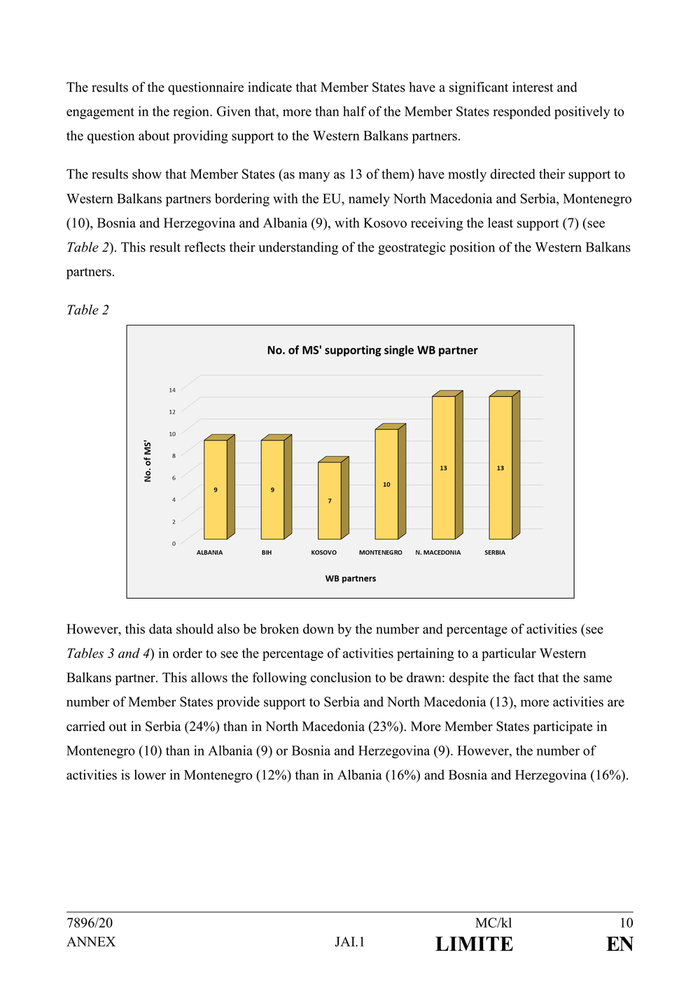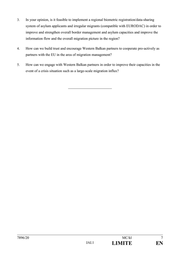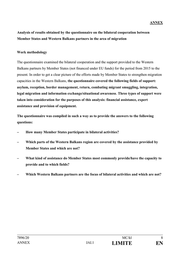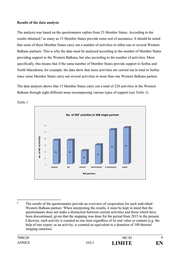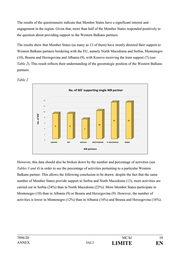st07896en20
Dieses Dokument ist Teil der Anfrage „Strategic Committee on Immigration, Frontiers and Asylum (SCIFA) in 2020“
Council of the European Union Brussels, 12 May 2020 (OR. en) 7896/20 LIMITE JAI 347 ASIM 24 MIGR 32 COWEB 56 ELARG 37 RELEX 317 NOTE From: Presidency To: Delegations Subject: Strengthening migration management capacities in the Western Balkan region - Presidency discussion paper On 19 February 2020, the joint HLWG/SCIFA discussions on the topic of strengthening migration management capacities with Western Balkan partners, held on the basis of the Presidency paper, led to overall agreement that the Western Balkan region is of great strategic importance for the EU in terms of the management of migration. The meeting provided an insight into substantial EU funding for the partners in the Western Balkans for asylum, migration management, and migration-related humanitarian assistance as well as the EU Agencies’ operational assistance and engagement in the region, namely through FRONTEX, EASO and EUROPOL. It was concluded that cooperation with the Western Balkan partners must be comprehensive and well coordinated, with EU Agencies playing an important role. It was stressed almost unanimously that the synergies of all EU and Member States’ actions in the Western Balkan region should be enhanced. More precisely, comprehensive and coordinated EU support should focus on: 7896/20 MC/kl 1 JAI.1 LIMITE EN

promoting efficient border management (including through the conclusion and implementation of all EBCG Status Agreements and through alignment with the EU’s common visa policy), increasing capacity for voluntary returns and stepping up support for readmission in countries of origin, combating human smuggling, continuing efforts to strengthen asylum and reception systems, while also building up more political will and ownership of migration actions, efficient exchange of information on irregular movements and migration management capacities among Western Balkan partners and with the EU, funding support. Divergences in the development of institutional capacity in the Western Balkan partners may arise because, in the current migration situation, they perceive themselves only as a transit region, in particular with regard to the fact that they are to a large extent affected by irregular secondary movements between EU Member States transiting through the Western Balkans. Enhancing their overall migration capacities - including the asylum system, the reception conditions and return capacities - is essential. To achieve this goal, it is essential to have a partnership based on mutual trust and willingness. In order to establish a stepping-stone for future strategic plans to strengthen migration capacities in the region, the Croatian Presidency initiated and undertook a comprehensive mapping of Member States’ non-EU-funded cooperation and activities in the area of migration management. The mapping results show that 15 Member States provide support in the region. As regards the fields of support, the results of the mapping clearly indicate that the majority of bilateral support is provided in two areas, namely border management and combating the smuggling of migrants (over 50% of all MS activities) (see Chart 1). At the same time, the results indicate a very low level of general support in the field of integration (2%) and the legal migration scheme (4%), as well as a relatively low level of support in the fields of asylum (6%), reception (8%) and return (7%). 7896/20 MC/kl 2 JAI.1 LIMITE EN

Chart 1 The mapping results also show that 15 Member States provide support in the region through either expert assistance, equipment or financial assistance. Overall, 67% of all the assistance provided takes the form of expert assistance (see Chart 2). Chart 2 7896/20 MC/kl 3 JAI.1 LIMITE EN

Support is not distributed equally among the Western Balkan partners. Member States’ assistance is focused mostly on the partners bordering the EU, i.e. North Macedonia and Serbia (almost 50% of all MS activities), while Kosovo is the partner with the lowest percentage of Member States’ activities (9%) (see Charts 3 and 4). Chart 3 Chart 4 This designation is without prejudice to positions on status, and is in line with UNSCR 1244/1999 and the ICJ Opinion on the Kosovo declaration of independence. 7896/20 MC/kl 4 JAI.1 LIMITE EN

It should be acknowledged that more than half of the EU Member States provide various types of support within a total of 228 activities, with the aim of helping to strengthen the partners’ migration capacities. The results of the mapping underpin the conclusions reached during the joint SCIFA/HLWG meeting: namely, that there is a need for a strategic and comprehensive approach that would result in long-term, sustainable migration management in the Western Balkan region. The support provided by Member States to date reflects their awareness of the geopolitical importance of certain Western Balkan partners, namely those bordering the EU. The majority of the support is directed towards the field of border management and combating the smuggling of migrants through expert assistance, thus indicating that Member States’ focus is on the prevention of irregular migratory movements to the EU. On the other hand, integration and labour migration schemes are among the least supported areas of engagement. Bearing in mind the overall migration situation, such an approach is both expected and understandable, but may contribute to strengthening the Western Balkan partners’ self-perception as a transit region, which poses a challenge for the further improvement of all aspects of their migration capacities. According to the results of the mapping, a substantial proportion of all the Member States’ activities are directed towards information exchange between MS and specific partners in the region. However, during the joint SCIFA/HLWG meeting, some delegates expressed concerns regarding the unsatisfactory level of unified information flow and the need for enhancement. Therefore the Presidency believes that there is a need to assess whether the current approach to this issue is appropriate and discuss possible new approaches. In addition, it can be seen that the activities of Member States and EU Agencies in their respective fields of competence tend to be directed at specific fields of interest, and are thus most likely to overlap as regards the relevant Western Balkan partners as well as the scope of support provided. 7896/20 MC/kl 5 JAI.1 LIMITE EN

All the aforementioned issues could have the effect of undermining the desired results, as the current approach does not fully enable comprehensive support for the Western Balkan partners to establish responsible and sustainable migration management, risking duplication in some areas while leaving gaps in others. The Presidency believes that the efforts which have been undertaken by Member States on this issue constitute a worthwhile contribution and give an added value to the overall EU engagement that should be widely acknowledged. Our common approach should therefore be well coordinated between EU institutions and Member States and should encompass equal support in all fields of migration management, rather than focusing on ad hoc solutions aimed at specific fields depending on current interests. The Presidency also firmly believes that the approach towards the comprehensive strengthening of Western Balkan migration capacities should be based on mutual trust between the EU and its partners, respecting them and acknowledging their importance for the EU, as this is an issue of shared interest and common responsibility. Western Balkan partners should be encouraged to assume a more active role in migration management. Against this background, Member States are invited to consider the following questions: 1. As Member States have already agreed on adopting a strategic approach towards Western Balkan partners, should this approach also address support in all areas of migration management in order to ensure a system which is sustainable in the long term? 2. As Member States report less bilateral cooperation in the area of returns from the Western Balkans to the countries of origin than with regard to certain other aspects of migration management, this is an area where more could be done to support the Western Balkan partners. Can you provide some examples of best practice in this area? 7896/20 MC/kl 6 JAI.1 LIMITE EN

3. In your opinion, is it feasible to implement a regional biometric registration/data-sharing system of asylum applicants and irregular migrants (compatible with EURODAC) in order to improve and strengthen overall border management and asylum capacities and improve the information flow and the overall migration picture in the region? 4. How can we build trust and encourage Western Balkan partners to cooperate pro-actively as partners with the EU in the area of migration management? 5. How can we engage with Western Balkan partners in order to improve their capacities in the event of a crisis situation such as a large-scale migration influx? 7896/20 MC/kl 7 JAI.1 LIMITE EN

ANNEX Analysis of results obtained by the questionnaire on the bilateral cooperation between Member States and Western Balkans partners in the area of migration Work methodology The questionnaire examined the bilateral cooperation and the support provided to the Western Balkans partners by Member States (not financed under EU funds) for the period from 2015 to the present. In order to get a clear picture of the efforts made by Member States to strengthen migration capacities in the Western Balkans, the questionnaire covered the following fields of support: asylum, reception, border management, return, combating migrant smuggling, integration, legal migration and information exchange/situational awareness. Three types of support were taken into consideration for the purposes of this analysis: financial assistance, expert assistance and provision of equipment. The questionnaire was compiled in such a way as to provide the answers to the following questions: – How many Member States participate in bilateral activities? – Which parts of the Western Balkans region are covered by the assistance provided by Member States and which are not? – What kind of assistance do Member States most commonly provide/have the capacity to provide and to which fields? – Which Western Balkans partners are the focus of bilateral activities and which are not? 7896/20 MC/kl 8 ANNEX JAI.1 LIMITE EN
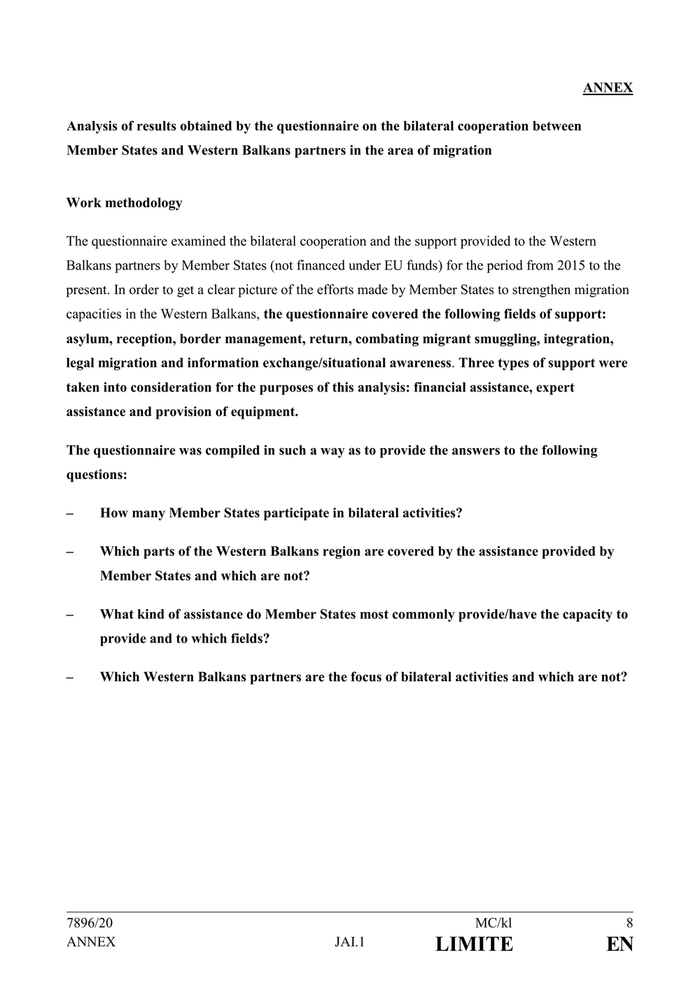
Results of the data analysis The analysis was based on the questionnaire replies from 23 Member States. According to the results obtained, 1 as many as 15 Member States provide some sort of assistance. It should be noted that some of these Member States carry out a number of activities in either one or several Western Balkans partners. This is why the data must be analysed according to the number of Member States providing support to the Western Balkans, but also according to the number of activities. More specifically, this means that if the same number of Member States provide support to Serbia and North Macedonia, for example, the data show that more activities are carried out in total in Serbia since some Member States carry out several activities in more than one Western Balkans partner. The data analysis shows that 15 Member States carry out a total of 228 activities in the Western Balkans through eight different areas encompassing various types of support (see Table 1). Table 1 1 The results of the questionnaire provide an overview of cooperation for each individual Western Balkans partner. When interpreting the results, it must be kept in mind that the questionnaire does not make a distinction between current activities and those which have been discontinued, given that the mapping was done for the period from 2015 to the present. Likewise, each activity is counted as one item regardless of its real value or content (e.g. the help of one expert, as an activity, is counted as equivalent to a donation of 100 thermal imaging cameras). 7896/20 MC/kl 9 ANNEX JAI.1 LIMITE EN
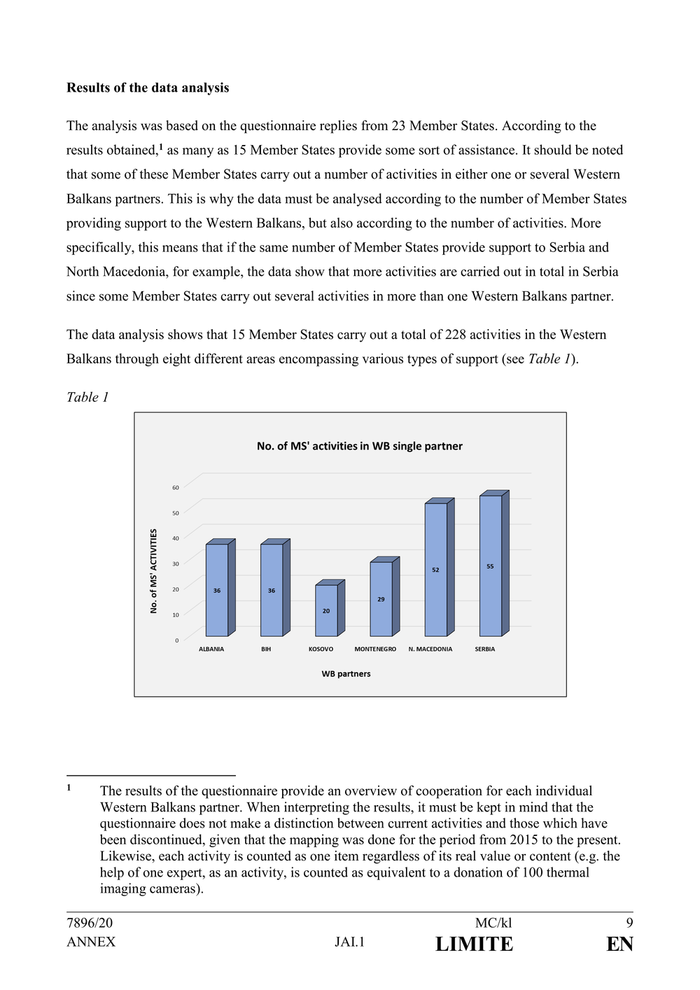
The results of the questionnaire indicate that Member States have a significant interest and engagement in the region. Given that, more than half of the Member States responded positively to the question about providing support to the Western Balkans partners. The results show that Member States (as many as 13 of them) have mostly directed their support to Western Balkans partners bordering with the EU, namely North Macedonia and Serbia, Montenegro (10), Bosnia and Herzegovina and Albania (9), with Kosovo receiving the least support (7) (see Table 2). This result reflects their understanding of the geostrategic position of the Western Balkans partners. Table 2 However, this data should also be broken down by the number and percentage of activities (see Tables 3 and 4) in order to see the percentage of activities pertaining to a particular Western Balkans partner. This allows the following conclusion to be drawn: despite the fact that the same number of Member States provide support to Serbia and North Macedonia (13), more activities are carried out in Serbia (24%) than in North Macedonia (23%). More Member States participate in Montenegro (10) than in Albania (9) or Bosnia and Herzegovina (9). However, the number of activities is lower in Montenegro (12%) than in Albania (16%) and Bosnia and Herzegovina (16%). 7896/20 MC/kl 10 ANNEX JAI.1 LIMITE EN
